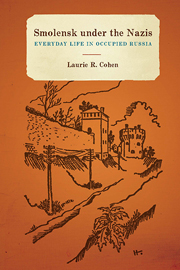Book contents
- Frontmatter
- Contents
- Acknowledgments
- Abbreviations
- Introduction
- Part 1 Methodologies
- Part 2 A Record of the War and Occupation
- Part 3 Popular Attitudes, Propaganda, and Enemy Imagery
- Part 4 Restoration and Reconstruction
- 10 Liberation and Revival
- 11 Interrogations, War Crimes Trials, and the Making of War History
- Conclusion
- Notes
- Bibliography
- Index
11 - Interrogations, War Crimes Trials, and the Making of War History
from Part 4 - Restoration and Reconstruction
Published online by Cambridge University Press: 05 December 2013
- Frontmatter
- Contents
- Acknowledgments
- Abbreviations
- Introduction
- Part 1 Methodologies
- Part 2 A Record of the War and Occupation
- Part 3 Popular Attitudes, Propaganda, and Enemy Imagery
- Part 4 Restoration and Reconstruction
- 10 Liberation and Revival
- 11 Interrogations, War Crimes Trials, and the Making of War History
- Conclusion
- Notes
- Bibliography
- Index
Summary
Thousands of civilians who had fled or been evacuated from Smolensk in July 1941 returned in the late fall of 1943 and found their city in ruins. Almost upon arrival, they were instructed by local authorities to remember and enumerate the losses of their personal and household belongings. Every single item, with its estimated value (price), was documented, and these statements were among the tens of thousands used by the Soviet authorities to calculate a comprehensive war reparations demand from Germany.
Those who had stayed in Smolensk during the occupation also faced another type of Soviet war reckoning, often a much more discriminating one. Seen in terms of military culture, that is, an occupation could be like the brutal rape of a town, as this Austrian report directly following the “liberation” of Russian-occupied Lemberg (L'viv) during the First World War poignantly captures: “The population is disoriented; they have lost their compass. One could compare them to a virgin, who was raped and who hates her rapist but still feels inclined towards him. Something sick and hysterical floats in the Lemberg air.” “Liberators” are thus not necessarily sympathetic to the pressing needs of the population. What they demand are “facts.” Like Russian collaborators and returning Soviet prisoners of war and Ostarbeiter, Russian residents now faced intense interrogations.
- Type
- Chapter
- Information
- Smolensk under the NazisEveryday Life in Occupied Russia, pp. 247 - 264Publisher: Boydell & BrewerPrint publication year: 2013

